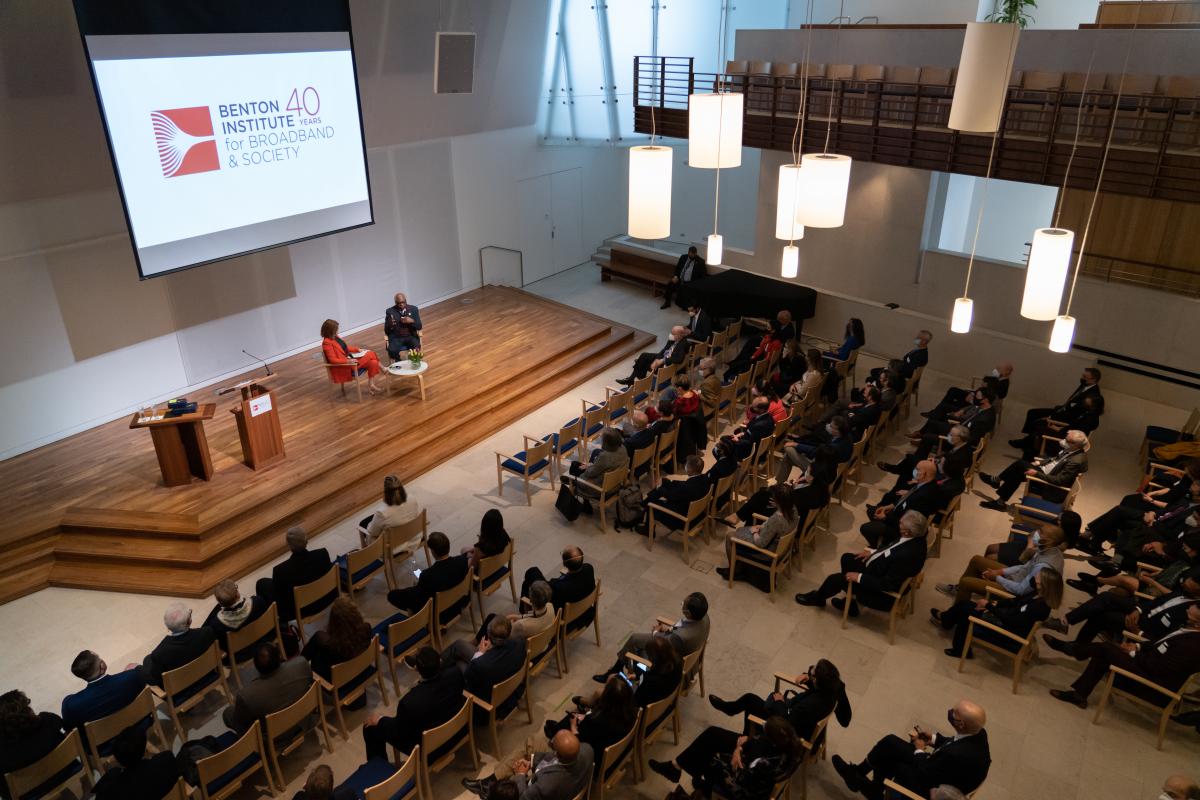Broadband and Building Community
Wednesday, May 4, 2022
Digital Beat
Broadband and Building Community

In a conversation on April 6 at the Benton Institute for Broadband & Society’s 40th anniversary celebration, House Majority Whip James E. Clyburn (D-SC) and Glen Echo Group CEO Maura Corbett discussed building community—and the role broadband will play in building and strengthening communities moving forward.
Congressman Clyburn founded the Rural Broadband Task Force to help find solutions to the digital divide. Much of the discussion on April 6 focused on bringing broadband to rural areas that, of yet, do not have broadband service. But Corbett asked about urban areas, too.
When President Joe Biden met with Congressional leaders to help shape the debate around infrastructure legislation, House Speaker Nancy Pelosi (D-CA) deferred to Majority Whip Clyburn to make the case for including broadband under the infrastructure umbrella since, traditionally, infrastructure was thought of as mainly roads, bridges, power systems, and buildings.
Before Congressman Clyburn could even finish his argument, Senate Majority Leader Chuck Schumer (D-NY) jumped in to say that 25% of the kids in New York City are not on the internet. They go down to the local library. They sit on the steps of the library to do their homework. Or they go to fast food places to do their homework.
The leadership agreed that universal broadband is a national challenge. “It is absolutely no different in the inner cities than it is in rural communities,” said Congressman Clyburn. He recognized that deploying broadband networks in rural areas presents its own problems, but “in some urban areas, there's as much disconnect as you'll find in rural communities.”
Corbett also asked the congressman to reflect on the circumstances that led to the historic investment in broadband. “What do you think would have happened had we not had COVID-19? Would we have been fighting this forever?” she asked.
“No, I don't think so,” Congressman Clyburn answered. “It might have taken longer.” But dealing with COVID accelerated the commitment. “What happened with our school children,” said Clyburn, returning to education, “we've got kids in South Carolina, that have lost more than a year of school. And it's unfair for my grandkids to be able to stay connected to education because they got the internet. And their schoolmates are going to get left behind because they did not have the internet. That, I think, makes the case a whole lot. COVID helped a whole lot of people to see the value of telehealth, because that touches a lot of people. So, I think it would have taken longer to get to, but I think we eventually would have done it. But certainly, you hate to think of a pandemic as being helpful, but it highlighted how serious this problem really is. And so, I think it would have taken some time to get there.”
Congressman Clyburn concluded, “I think the thing we've got to get to is learning our value to each other. That's what we've got to learn.”
 He illustrated the point by relaying the story of Thomas Edison who, of course, invented the light bulb, but had a problem getting it to work properly. Edison could get the light bulb to come on, but it would overheat and, then, go out. Edison was told of a man in Massachusetts who had invented something called a 'filament.' Edison was advised to go speak with fellow inventor Lewis Latimer. Latimer was the son of former slaves. His parents had escaped from slavery. Edison visited Latimer, the inventor of the filament and, sure enough, Latimer's filament made Thomas Edison's light bulb work properly.
He illustrated the point by relaying the story of Thomas Edison who, of course, invented the light bulb, but had a problem getting it to work properly. Edison could get the light bulb to come on, but it would overheat and, then, go out. Edison was told of a man in Massachusetts who had invented something called a 'filament.' Edison was advised to go speak with fellow inventor Lewis Latimer. Latimer was the son of former slaves. His parents had escaped from slavery. Edison visited Latimer, the inventor of the filament and, sure enough, Latimer's filament made Thomas Edison's light bulb work properly.
It is a fact that if we are going to make the progress we need to make to get to where we need to be in this country, we are going to have to develop the will to get outside of our comfort zones. Thomas Edison got outside of his comfort zone and sat down with this black guy up in Massachusetts, who got outside of his comfort zone. And allowed the meeting to take place. And together, they lit the world.
Additional Content from the Celebration
The Benton Institute for Broadband & Society is a non-profit organization dedicated to ensuring that all people in the U.S. have access to competitive, High-Performance Broadband regardless of where they live or who they are. We believe communication policy - rooted in the values of access, equity, and diversity - has the power to deliver new opportunities and strengthen communities.
© Benton Institute for Broadband & Society 2022. Redistribution of this email publication - both internally and externally - is encouraged if it includes this copyright statement.
For subscribe/unsubscribe info, please email headlinesATbentonDOTorg






